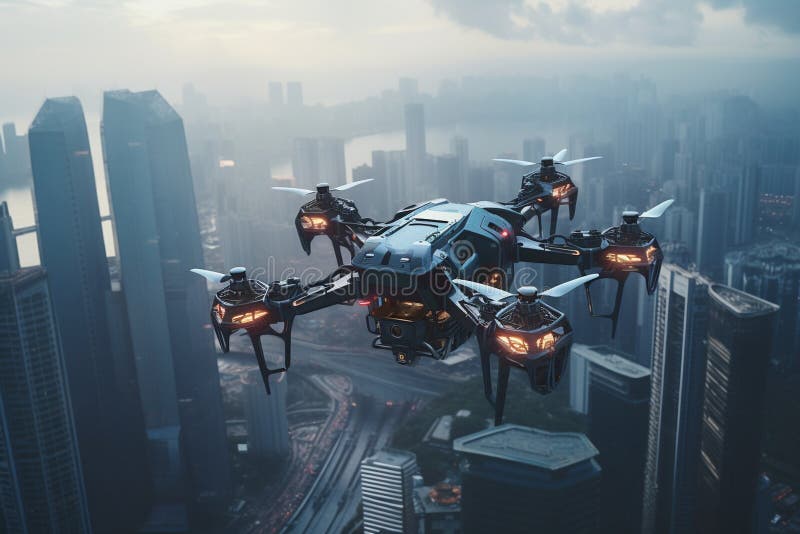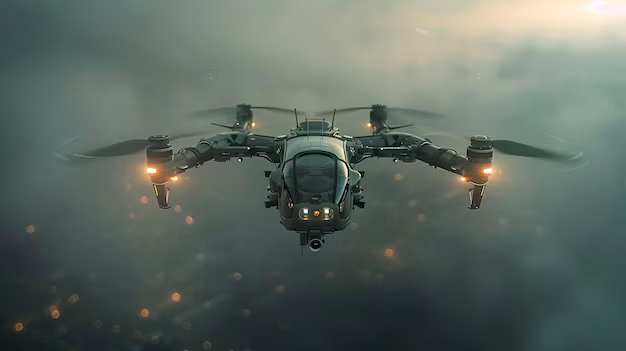
In recent years, artificial intelligence (AI) has revolutionized numerous industries, and the military sector is no exception. Among the most significant advancements is the development of AI-powered military drones, which are transforming modern warfare. These drones, equipped with AI and machine learning capabilities, can autonomously conduct missions, ranging from reconnaissance and surveillance to direct combat operations. While the use of AI military drones offers unprecedented strategic advantages, it also raises critical ethical, legal, and security concerns. As these technologies evolve, they promise to reshape the future of warfare in profound ways.
1. AI Military Drones: Capabilities and Applications
AI-powered drones are designed to enhance the capabilities of traditional unmanned aerial vehicles (UAVs). The integration of AI allows these drones to perform tasks with higher precision, speed, and autonomy than ever before. Key capabilities include:
- Autonomous Decision-Making: AI allows drones to make real-time decisions without direct human control. For example, drones can autonomously identify and engage targets based on preset criteria, potentially reducing the need for human intervention in combat situations.
- Surveillance and Reconnaissance: AI drones can analyze vast amounts of data from cameras, sensors, and other intelligence-gathering equipment in real-time. This allows for more efficient surveillance, identifying threats or gathering intelligence in areas that might be too dangerous for human operators.
- Swarming and Coordination: AI drones can communicate and coordinate with other drones in a “swarm” configuration. This can enhance effectiveness in both offensive and defensive operations, allowing for greater flexibility in tactical maneuvers and resource allocation.
- Precision Strikes: AI can improve the accuracy of airstrikes, ensuring that targets are hit with greater precision while minimizing collateral damage. By analyzing terrain, weather conditions, and target information, AI drones can select the most effective attack method and timing.
2. Strategic Advantages for Military Forces
The use of AI-powered military drones offers several key advantages to nations deploying them:
- Reduced Risk to Human Soldiers: Drones can perform dangerous tasks, such as flying over enemy territory or engaging hostile forces, without putting human lives at risk. This can save military personnel from harm while maintaining operational effectiveness.
- Increased Operational Efficiency: Drones powered by AI can carry out surveillance, reconnaissance, and even combat missions around the clock without the need for rest, food, or sleep. This continuous presence allows for more persistent intelligence-gathering and quicker response times.
- Cost-Effectiveness: AI drones may be more cost-effective than traditional manned aircraft. They are generally smaller, lighter, and cheaper to produce and maintain, potentially providing a more economical solution for military forces, especially in prolonged conflicts.
- Enhanced Precision and Minimization of Collateral Damage: AI drones, with their advanced targeting systems, can minimize civilian casualties by distinguishing between combatants and non-combatants more accurately than human operators might be able to, particularly in complex and crowded urban environments.
3. Ethical and Legal Concerns
The increasing use of AI military drones brings with it a range of ethical and legal concerns:
- Autonomy in Lethal Decision-Making: One of the most debated issues is the prospect of AI drones making autonomous lethal decisions. Should AI systems be given the authority to select and eliminate targets without human oversight? Critics argue that this could lead to violations of international humanitarian law, especially in scenarios where drones might misidentify targets, leading to civilian casualties.
- Accountability and Responsibility: If an AI drone makes a mistake, such as attacking the wrong target or causing unintended harm, who is responsible? Is it the military commanders who programmed the AI, the engineers who built it, or the AI system itself? The lack of clear accountability could complicate legal frameworks and hinder efforts to hold parties accountable for war crimes.
- Escalation of Conflict: AI drones, particularly when deployed in swarming formations, could potentially escalate conflicts. Autonomous drones, without human intervention, may act in ways that intensify tensions or provoke retaliation, leading to unintended consequences. Additionally, the use of AI drones in combat might lower the threshold for initiating military action, making conflicts more likely.
- Moral and Ethical Dilemmas: There are also concerns about the ethics of using AI to carry out tasks that involve life-and-death decisions. The dehumanization of warfare, where machines rather than people make key decisions, could erode the moral compass of military actions and diminish empathy for those affected by war.
4. Geopolitical Implications and Arms Race

The rise of AI military drones could trigger an arms race among nations, as countries strive to develop increasingly advanced and capable drone fleets. Nations that lead in AI drone technology may gain significant strategic advantages, potentially shifting the balance of power globally. However, this could also destabilize international security, as nations without access to such technologies may feel vulnerable or even compelled to develop their own AI-driven military capabilities.
- Security Risks and Cyber Vulnerabilities: AI drones are susceptible to hacking and cyberattacks. Malicious actors could potentially take control of drones, redirecting them to unintended targets or using them as tools for espionage or sabotage. As military forces become more reliant on AI systems, the risk of cyberattacks grows, threatening both national security and global stability.
- Global Proliferation of AI Drone Technology: The spread of AI drone technology to non-state actors and rogue states could create significant challenges. Groups with access to such technology could potentially use drones for terrorist attacks, destabilizing regions or even targeting civilian infrastructure.
5. Future of AI Military Drones
As AI technology continues to evolve, so too will the capabilities of military drones. Future developments may see drones capable of carrying out more complex missions, such as multi-domain operations involving land, air, and sea components, or even autonomous drones that collaborate with human soldiers in real-time.
The ethical, legal, and strategic challenges presented by AI military drones will likely shape the trajectory of this technology. It will be important for international bodies, such as the United Nations, to establish clear regulations and frameworks for the use of AI in warfare to ensure that these technologies are used responsibly and with respect for human life.
Conclusion: The Double-Edged Sword of AI Drones
AI military drones offer enormous potential to transform modern warfare, improving operational efficiency, reducing human casualties, and enhancing precision in military operations. However, the ethical, legal, and security concerns associated with their use cannot be ignored. The development of autonomous lethal decision-making systems, accountability issues, and the risk of conflict escalation are significant challenges that need to be addressed. As AI military drones become more prevalent, it is crucial for governments, international organizations, and military leaders to carefully consider the long-term consequences of this technology on global security and stability.
Follow us on INSTAGRAM – https://www.instagram.com/virenbrew/
Follow us on TWITTER (X) – https://x.com/VIRENbrew
Follow us on LINKEDIN – https://linkedin.com/in/viren-brew-230415328/
Follow us on FACEBOOK – https://www.facebook.com/profile.php?id=61565127137999
Follow us on YOUTUBE – https://www.youtube.com/@VIRENbrew

No responses yet